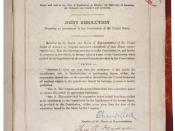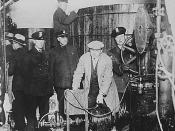The Prohibition: Rum Runners and the Bahamas
The American Prohibition (1920 - 1933) began with moral intentions but was ultimately repealed. During that period, the citizens engaged in illicit alcohol distribution and black market operations; the demand for liquor imports was high and supplying that demand was profitable. Smugglers in Florida and New York worked with Caribbean islands to establish exchanges, with the Bahamas playing a significant role due to its proximity and importation capabilities. The Prohibition era proved to be invaluable to the Bahamas' economic development. It provided the framework necessary for the development of a stable political and economic environment that has made the Bahamas a prosperous region. The economic boom of the illegal alcohol trade, tourism, and investment pushed Bahamian development forward through a difficult environment that left most of the Caribbean struggling. The 1920s and early 1930s provided the colony with a catalyst for success, essentially shaping the Bahamas into what it is today.
The Prohibition
The Prohibition era began in 1920 when the ratified Eighteenth Amendment took effect. The National Prohibition Act passed in 1920, provided enforcement framework for the amendment and clarifications as to exactly what was banned. The movement behind the Prohibition was led by a Protestant group and coordinated by the Anti-Saloon League ("Prohibition"). The parties in favor of the ban cited the amendment and subsequent Act as a success and a victory for public health and morality. Those against it, known as 'wets,' argued that prohibition was the intrusion of rural Protestant ideals on a central part of urban cultural life (Kobler 59).
Despite the legislation in place, enforcement of the Eighteenth Amendment proved to be difficult. The law was widely disregarded, lacked popular support, generated some political and official corruption, and fostered the growth of organized crime. Although the amount...


